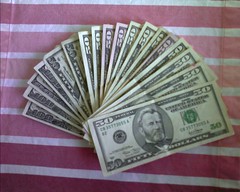 Image via Wikipedia
Image via Wikipedia
Recycling includes re-using items creatively. Buy products that are made from recycled items. Many companies are now making products from recycled materials, including furniture, clothing, flooring, packaging materials, stationary and even dog beds, dog toys and dog clothes. The various materials used for recycling include aluminum, plastic soda bottles, reclaimed cotton, reclaimed wood, rubber and paper.
Reuse shopping bags. The plastic kind can be used as small trash can liners. If you shred documents, use the shredded paper as packing material when shipping things. Reuse partially used notebooks - just rip out the used part and use the rest. Instead of throwing away printer paper that has been botched on one side, cut it up and use the front as scratch paper. Instead of throwing away old t-shirts and socks, re-use them as dusting cloths or rags. Instead of buying new books, go to your library and save paper by checking out books with your library card.
![Reblog this post [with Zemanta]](http://img.zemanta.com/reblog_e.png?x-id=8d542d46-fd76-4b96-9b71-f1e0ae9cf3c0)

![Reblog this post [with Zemanta]](http://img.zemanta.com/reblog_e.png?x-id=954923d1-1ebc-4d51-8625-73e8f150b65f)
![Reblog this post [with Zemanta]](http://img.zemanta.com/reblog_e.png?x-id=30614626-084a-45de-8346-acffd143028d)

![Reblog this post [with Zemanta]](http://img.zemanta.com/reblog_e.png?x-id=dde3efb8-2ca0-4f75-9f7a-97797f2ccb88)

![Reblog this post [with Zemanta]](http://img.zemanta.com/reblog_e.png?x-id=de8ab651-67f1-461f-9ee2-668c5806936e)